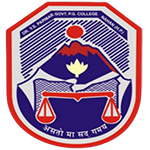BACHELOR OF ARTS (B.A.)
Students who opt for a BA Degree have a diverse array of subjects to select from, including History, Political Science, Geography, Sociology, Psychology, and Art, in addition to mandatory subjects such as Hindi, English, and Environmental Science. They gain insight into an integrated, multidisciplinary, and experimental approach to studying how humans, animals, and machines process information.
The ongoing BA programme has undergone a significant shift in its approach and perspective, transitioning from a purely cognitive one to one that prioritizes employability at its very core objectives. Consequently, each subject within the program now includes Skill Enhancement Courses to enhance its value. These skill enhancement courses render the students’ skills marketable, equipping them well for a rewarding professional future.
Rather than merely approaching education from a theoretical standpoint, the program now engages with its students in practical terms, assisting them not only in identifying avenues to apply that knowledge but also in seeking employment and livelihood.
Outcomes of the BA Programme:
I. Cognitive Skills: Our students, while studying a combination of subjects offered by the institution, cultivate a keen awareness of our country’s history, society, culture, and political heritage. The program aids in making our students cognizant of our sociological, cultural, and religious diversity and harmony. Therefore, the cognitive skills acquired will enable the students to develop perspectives on contemporary society, both locally and globally.
II. Employability Skills: Employability remains at the very heart of the program. Upon completion of the degree, our students become eligible for employment in fields such as journalism, hospitality, law, advertising, theater, education, tourism, horticulture, and various other industries. The program places significant emphasis on developing reading, writing, and comprehension skills, making the students well-prepared and eligible for positions in both government and non-government sectors. A comprehensive study of various subjects equips them to compete in various employment examinations post-graduation.
III. Affective and Behavioral Values: Humanities play a significant role in instilling values in our students. They are highly conscious of environmental issues, hygiene, and other aspects of social responsibility. Engaging in various activities throughout the three-year program, be they social, religious, political, or cultural, helps shape individuals who comprehend and appreciate religious and cultural diversity and pluralism.
The interdisciplinary nature of the curriculum allows you to explore a wide range of perspectives. Students interested in Arts and Humanities can delve into understanding how human nature, society, and culture interact and evolve.
